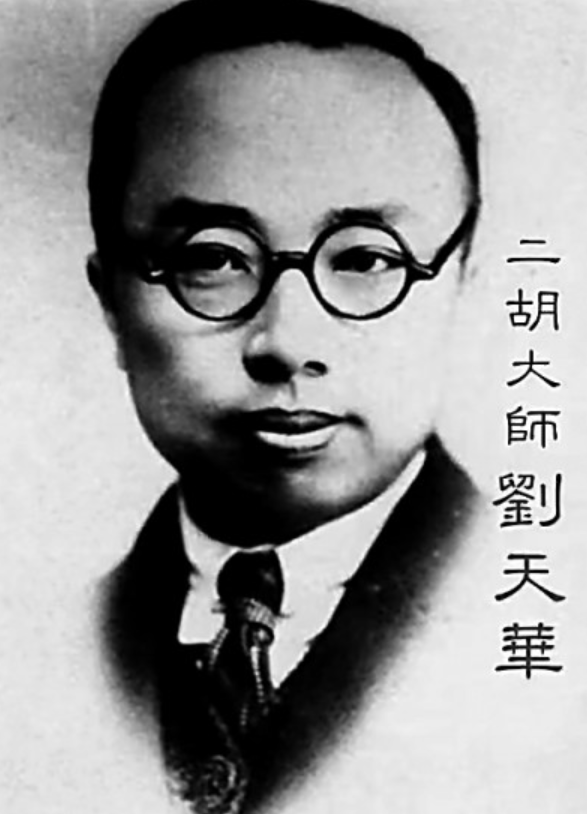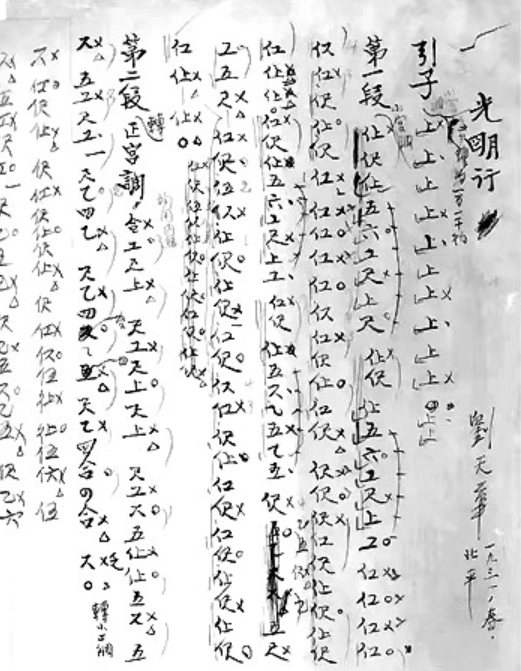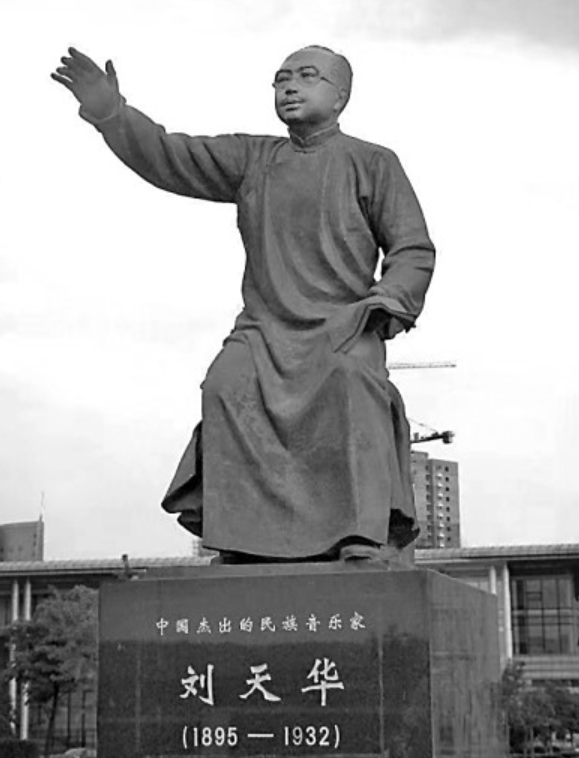Let National Music Share the Beauty with World Music -- Commemorating the 90th Anniversary of the Death of Liu Tianhua, a Master of National Music
This year marks the 90th anniversary of the death of Liu Tianhua, a master of Chinese music. "National music and western music keep abreast" has always been Liu Tianhua's ideal and goal. The ideals he put forward and explored, such as "music should be rooted in Chinese traditional culture and folk music", "music should take into account the general public", and "improvement of national music", still have a strong reference significance for the development of current national music in China.

Liu Tianhua Statue
1. Creation is deeply rooted in Chinese traditional culture and folk music
Liu Tianhua was born in Jiangyin, Jiangsu Province in 1895. As a child, Liu Tianhua had a strong interest in folk music and was often intoxicated with various folk music activities. "Listening to the sound of bells and drums and orchestras" made him forget to leave. While studying in Changzhou Middle School, he joined the military band of the school, mastered the performance of western brass instruments, and came into contact with opera music, further showing his interest and talent in music. In 1913, with his brother Liu Bannong, he went to Shanghai to participate in the Kaiming Drama Club, a progressive drama organization, and learned music theory and western instruments. From then on, the idea of "improving national music" emerged. In 1914, after the dissolution of the Kaiming Drama Club, he returned to his hometown. During this time, he visited folk artists and asked for advice modestly. He studied erhu and pipa from Zhou Shaomei, a folk musician in the south of the Yangtze River, and played Yingzhou Ancient Tune from Shen Zhaozhou, a pipa master of Chongming School. In order to further study folk music, he went to Henan to study guqin, visited folk artists along the way, collected folk music and learned Buddhist music; He also specializes in Kunqu Opera, organizes Kunqu Opera clubs at home, studies Peking Opera and local operas, and learns how to play with three strings. In his research, he constantly comprehended the rich connotation of Chinese traditional culture and folk music.

The manuscript of the famous erhu song Bright Walk created by Liu Tianhua
Liu Tianhua deeply rooted his music creation in the gene of Chinese traditional culture and folk music. He believed that as a Chinese musician, he should not only keep his own tradition, but also carry forward Chinese music. He organically integrated excellent traditional culture and folk music elements with western creation techniques, and created ten erhu songs such as Singing in Sickness, Good Night, Sad Songs, Singing in Leisure Dwelling, Birds Whispering in the Empty Mountain, and Bright Walk, as well as pipa songs, Songs and Dances, Improved Exercises, and Voices. These works are full of traditional cultural connotations and artistic beauty. For example, as one of the most influential music of Liu Tianhua, "Birds Whispering in the Empty Mountains" refers to "Deer firewood" by Wang Wei, a poet of the Tang Dynasty. "Nobody can be seen in the empty mountains, but people can be heard talking. Return to the scene and enter the deep forest, and take photos again on the green moss" and "Listen to Zi Gui and cry at night and worry about the empty mountains" in Li Bai's "Difficult Sichuan Road". The "Zi Gui" (cuckoo) is skillfully combined with "Moonlight Night", and the erhu is used to simulate bird talk, so that the audience can feel the green spring in the quiet empty mountains, and the flowers and birds sing, The movement and stillness are appropriate, reflecting the author's noble sentiment of pursuing simplicity and being happy.

Statue of Liu Tianhua
In his creation, Liu Tianhua made full use of China's traditional music creation rules, drawing on and absorbing various Western instrument playing skills and creative methods. For example, in his first erhu song "Singing in Sickness", he used such playing techniques as the improvisation of folk bowstring instruments to change hands and jump in, to reflect the emotions of ups and downs, and used the common long music sentences in folk vocal tones in his works to express the tortuous, tactful and continuous feelings and thoughts, and added the unique techniques of changing sounds and rhythms in western music. His works have a wide range of subjects, the language of creation is close to life, has rich emotional expression, highlights the national characteristics, makes erhu radiate new artistic vitality, and also arouses the cultural self-confidence of the people.
2. Let more people learn national instrumental music, love and spread national music
The main function of ancient Chinese music is to serve the feudal rulers. After the May 4th Movement, a large number of western music entered China, and various musical trends emerged. Influenced by the trend of thought of "civilian literature" in the May 4th New Culture Movement, Liu Tianhua advocated the view of "civilian music", which is a valuable and simple view of serving the masses. He opposed "music becomes a toy for nobles". He believed that although some people were learning to play and sing from these people, most of them were aristocratic. It is really a remote thing to say that music can be popularized to the general public. He hoped that "gentlemen who advocate music should not sing loudly, but should take into account the general public. Otherwise, it is not the artist's original intention to use music as a toy for nobles". Liu Tianhua advocated that "music should take into account the general public". He selected erhu and pipa, which are more popular among the public, to transform them, so that they can be more accepted and loved by the general public, so that more people can learn national instrumental music, love and spread national music.
In 1922, Liu Tianhua was recommended to the Music Institute attached to Peking University as a national music tutor. With his efforts, erhu music also entered colleges and universities. He also taught erhu and pipa in the Department of Music of Beijing Women's Normal University and Beijing Art College, providing favorable conditions for him to realize his ideal of improving national music. During this period, he studied violin from Russian violinists Tonov and Oboro, and learned composition theory from American professor Fan Tianxiang. Through research, he learned from the advantages of the violin to improve the erhu and pipa. On the basis of inheriting the traditional playing techniques of erhu, he boldly borrowed the playing techniques of western musical instruments, the techniques of string rubbing, vibrating bow, sliding, etc. of violin, and the ring finger technique of piano, which enriched the playing effect of erhu; The bow and fingering techniques of erhu are standardized; The materials and technology of erhu production have been adjusted to achieve better timbre and volume; The intonation of the two strings of the erhu was adjusted, and the playing skills of the erhu were reformed. By shifting the handlebars, one handlebar was expanded to five handlebars, breaking through the tradition of playing with only one fixed handlebar, and expanding the range from nine degrees to nearly three octaves, so that the expressive force of the erhu became more rich. Liu Tianhua also innovated the pipa. He added the traditional pipa with four phases and ten tastes, made six phases, and added the taste of half tone. He formulated the twelve average rhythm system that can make the pipa transfer freely, which greatly enhanced the artistic expression of the pipa.
In addition, Liu Tianhua attaches great importance to the promotion and education of music. He was interested in learning music from the general public at any cost, and held concerts from time to time to promote national music. In modern society, many zither children and adults are keen to learn various national instruments such as erhu and pipa, which is corresponding to Liu Tianhua's original proposal that "music should take into account the general public".
3. Devote all his life to improving and revitalizing national music
At the beginning of the 20th century, the ruling authorities did not attach importance to music, and the fate of national music was worrying, especially the erhu music, which was underground. At the same time, a large number of western music was introduced into China, and various new music forms were emerging. There has been a heated debate on where the development of national music should go. The "quintessence school" advocates "reviving elegant music", rejects "western music", believes that only traditional music is the way out for China, while the "Chongyang school" advocates "learning only western music", and believes that everything in the West is the most advanced. Liu Tianhua felt that if he did not improve and revitalize the national music, it would surely decline. Therefore, he took improving and rejuvenating the national music as his lifelong goal. He cherished the Chinese national music tradition, but did not approve of the conservative and incomplete "quintessence of Chinese culture". He advocated taking the advantages of Western music and making up for the shortcomings of national music. In his opinion, "Today's national music is like gold hidden in the sand, which must be extracted and refined to be useful"; He advocated that the development of Chinese music should be based on China's profound traditional music culture, draw on the "eclectic" Western music, and promote the development of China's music industry in the integration of Chinese and Western music.
In order to further improve and revitalize the national music, in May 1927, Liu Tianhua, Xu Xilin, Wu Bochao and other 35 like-minded people jointly launched the "National Music Improvement Society", invited Cai Yuanpei, Liu Bannong, Xiao Youmei, Zhao Yuanren and other honorary members, and founded the Music Magazine. He pointed out in his speech at the founding meeting of the "National Music Improvement Society" that, "The culture of a country is definitely not a matter of copying others' fur. Conversely, it is not a matter of sticking to the old law and sticking to one's own ideas. On the one hand, it must adopt the inherent essence of the country, on the other hand, it must accommodate foreign trends, and make a new way out of the harmony and cooperation between the East and the West, so that we can say" progress "." Liu Tianhua made a specific and detailed work plan for the National Music Improvement Society: to investigate and visit local folk musicians, collect existing music scores and instruments, collect books on national music, and record the collected folk music with music scores and print them for publication; Improve the notation to unify it with the world music, and compile various performance methods into systematic books so that the general public can learn; Organize musical instrument factories and improve musical instrument manufacturing; Publish publications, set up schools, cultivate music talents, organize research, introduce Western music, and promote the development of national music by "combining Chinese and Western music, and connecting them".
Liu Tianhua wrote in the publication of the "National Music Improvement Society" that "Gol, on the one hand, is a descendant of the Yellow Emperor, and we cannot continue to carry forward national music. There is no reason to be a sage for thousands of years. On the other hand, as a human being, we can only eat the fruits made by westerners, but not contribute to the fruits of our ancestors. How can we shake hands with people from other countries to make a fortune?" Under the guidance of this thought, the goal of his National Music Improvement Society is to popularize national music in China in the small period, and join hands with Western Music in the big period, so as to benefit the music of mankind.
Liu Tianhua devoted all his life to improving the cause of national music with painstaking efforts and painstaking attainments. After thousands of setbacks, he hoped that national music could stand on its own in the world. He reformed and innovated the ideas and achievements of national music, which provided valuable experience for the development of modern national music in China and played an important role in laying a foundation and demonstrating. His indelible contributions to the creation, performance, teaching and research of national instrumental music have led to the path of professional development of national instrumental music. As successors, we use Chinese music to tell the world a good story about China and contribute to the great rejuvenation of the Chinese nation.
Involving the artist
Involving musical instruments
Guess you like
Hot news
- 01 The handsome guy in 1997 is so advanced in pulling erhu! Netizen: Come and "wash your ears"
- 02 Dulcimer exam and performance repertoire
- 03 The Simple Difference Between Guqin, Se, and Guzheng
- 04 Pipa narrative epic -- the origin, connotation analysis and artistic charm of the famous song Sai Shang Qu
- 05 Ten Famous Yangqin Songs
 渝公网安备 50010702504639号
渝公网安备 50010702504639号